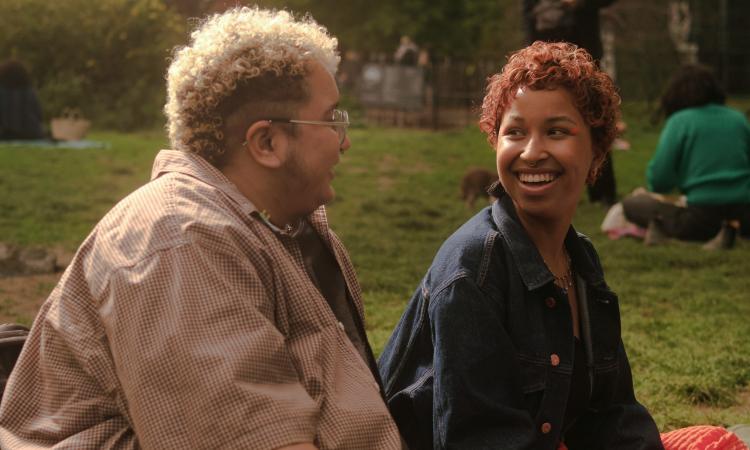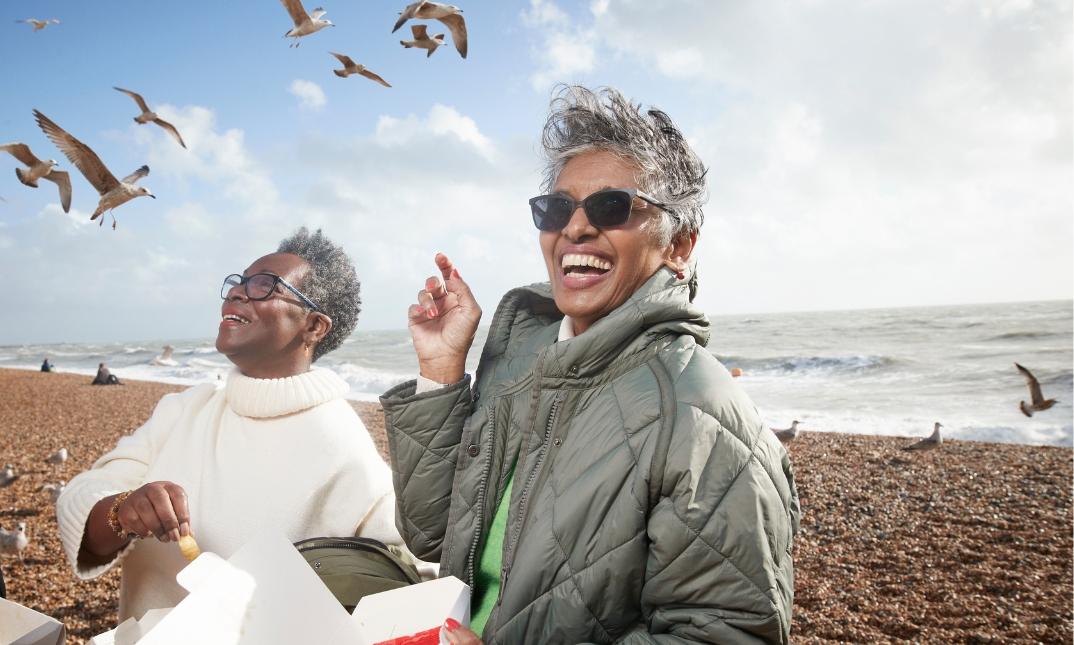For transgender and non-binary people in the UK, supportive communities can enable our survival.
As a trans person living in Scotland, the recent increase in and acceptability of transphobia in the UK has been frightening. Like everyone, trans and non-binary people need communities where we can be ourselves, feel supported, support others and work towards shared goals.
Transgender and non-binary people already face significant discrimination globally and in the UK. And transphobia has only increased in recent years1 following opposition to the reform of the Gender Recognition Act and the demonisation of trans women by politicians, hate groups and in the media. It is no surprise therefore that trans and non-binary people are more likely to experience mental health issues, suicidal ideation and to die by suicide than cisgender people.2

We face discrimination in our everyday lives and hostility to trans lives is hard to escape. When you simply go to the shops, the newspaper headlines are full of portrayals of trans people (particularly trans women) as deceptive and predatory, with any bad actions by individuals generalised to portray all trans people as dangerous. Going to the bathroom or walking down the street involves the fear and often reality that you will be verbally or physically abused. Research by Scottish Trans in 20243 found trans and non-binary people were less likely to positively rate their neighbourhood compared to the general population with over 60% avoiding at least one public service due to fear of being outed or harassed due to being trans. Fear unfortunately can be a daily reality of being trans.
This has only intensified following the recent Supreme Court decision4, where despite no trans people being heard by the court, it was unanimously decided that women in the Equality Act (2010) refers exclusively to cisgender (non-transgender) women. Statements by politicians and the Equalities and Human Rights Commission (EHRC) have only intensified the fear and despair of trans and non-binary people that we will be excluded from the spaces and services that enable us to go about our daily lives.
Trans and non-binary people already avoid a lot of public services, especially bathrooms and this ruling and statements by politicians as well as forthcoming EHRC guidance will only make it harder for trans and non-binary people to work, study, volunteer, exercise, socialise and attend appointments. In response trans and non-binary people have organised protests across the UK and we recognise that this attack on our rights will only make women and other marginalised communities less safe alongside trans and non-binary people.
Being trans or non-binary is not a mental health condition but facing transphobia in our everyday lives means many of us develop poor mental health.
This means that finding and participating in supportive communities is all the more important for trans and non-binary people and in doing so can reduce the negative impact that systematic transphobia has on our mental health.
Supportive communities can go some way to meeting the unmet needs of trans and non-binary people.
This is particularly the case in trans and non-binary specific communities where peer and social support can be invaluable in enabling our survival. Such communities where trans people can connect with others, learn skills and support each other are necessary when public services and society fail to meet our basic needs. Mutual aid and informal support and volunteering are therefore common in communities of marginalised people such as trans and non-binary people when other services fail to include us or protect us from harm.
Trans and non-binary people have always been here and so have trans and non-binary communities, even when wider society has been and continues to be hostile to our existence and participation in everyday life.
When we have places whether online or in-person, where we can feel welcome and safe, this can help us process and respond to negative experiences and feel rare validation in a society that is hostile to us. Many trans and non-binary people may be estranged from their families due to transphobia and so forming new connections is even more important.
As trans and non-binary people are a relatively small proportion of the population, online spaces from Discord servers to Facebook groups and more can be helpful especially for those in rural locations or in small or unsupportive towns and cities. However, it is important that online communities are properly moderated by those that use them as many social media platforms which (like the legacy media) are already underregulated have further regressed to allow even more transphobic harassment, microaggressions and hate speech.

A lot of trans and non-binary people who are already more likely to have low income must choose between transition related costs and buying food and paying bills and unlike transphobic hate groups which are well funded (including by socially conservative organisations in the USA), many organisations that support trans and non-binary people are underfunded. Therefore, practices of mutual aid where trans and non-binary people support each other despite limited resources are vital. Whether this is a community meal, crowdfunding for transition related costs, self and collective advocacy or protesting the erosion of trans rights, it is important that we build communities of self and collective care.
This connection and mutual aid can help us respond to the hostility to our lives with hope instead of despair. Supportive communities are essential for maintaining our mental health and wellbeing as well as ever increasing the spaces we don’t have to feel constant anxiety, fear and despair. Where together we can talk, perform, create, take action and even just exist.
Tips for supportive communities
- Publicly support trans and non-binary rights.
- Explicitly state that trans and non-binary people are welcome and valued.
- Have visible trans and non-binary people within the community.
- Explicitly state that women’s bathrooms and spaces include trans women and non-binary people as well as cis women, that men’s bathrooms and spaces include trans men and non-binary people, and provide gender neutral facilities as an additional option.
- Encourage and take seriously any reporting of transphobic harassment and hate speech, including online. Many social media sites and apps fail to adequately moderate transphobic harassment and hate speech.
- Have spaces, caucuses or networks for trans and non-binary people within wider organisations.
- Trans inclusion training is important to increase awareness and promote inclusion within communities.
- Celebrate and commemorate important days such as Trans Day of Visibility, Trans Day of Remembrance as well as Pride and International Day Against Homophobia, Biphobia, Interphobia and Transphobia.
- Collaborate with trans and non-binary organisations and individuals.
- Fund organisations and communities that support trans and non-binary people.
- Don’t expect trans and non-binary people to have to constantly debate our rights as if it is some abstract debate.
- Listen to and amplify trans and non-binary voices particularly those who are multiply marginalised.
How can I find a community as a trans or non-binary person?
From local groups to online spaces, sports clubs and community centres - there are lots of ways to connect with other trans and non-binary people.
Here are some ways you can find a new community:
UK-wide:
- Trans+Connect: online peer support groups from Not A Phase
- Trans Unite: support groups
- LGBT Foundation: trans local groups
- Mermaids: local and online groups
In Scotland:
- Connecting with other trans people from Trans Scotland
- LGBT+ Sports - LEAP Scotland
- Social support - LGBT Health and Wellbeing
- Find a local group - LGBT Youth Scotland
In Northern Ireland:
In Wales:
- Trans Aid Cymru
- Unique Transgender Network - serves North Wales and West Cheshire
How community benefits your mental health
Being part of a community can make life feel more meaningful and enjoyable, help us feel happier and safer, and improve our mental health. Read our 10 tips on how to get involved in your community.
Read our blog
How to foster positive community in group settings
Sam, Project Manager of Mental Health Foundation’s Bridges to Belonging project working with asylum seeking and refugee groups, shares their view and tips on fostering positive community in group settings.
Online safety and mental health are more connected than ever before
As part of our ‘Community’ theme for Mental Health Awareness Week, we’re exploring people’s online communities, and suggesting what we all – and the government – can do to better navigate an increasingly complex online world.
Mental Health Awareness Week
Since 2001, the Mental Health Foundation has been leading Mental Health Awareness Week - bringing the UK together to focus on getting good mental health. This year, the week takes place from 12 to 18 May 2025 and the theme is 'community'.
Find out more
1. YouGov - Where does the British public stand on transgender rights in 2024/25?
2. Bailey L., Ellis S.J. and McNeil J. (2014) “Suicide risk in the UK trans population and the role of gender transition in decreasing suicidal ideation and suicide attempt”. Mental Health Review Journal. 19(4), pp.209-20. doi: http://doi.org/10.1017/S1049096510990604;
Jackson, S.S., Brown, J., Pfeiffer, R.M., Shrewsbury, D., O’Callaghan, S., Berner, A.M., Gadalla, S.M. and Shiels, M.S. (2023) Analysis of Mortality Among Transgender and Gender Diverse Adults in England. JAMA network open, 6(1), pp.e2253687. doi: http://doi.org/10.1001/jamanetworkopen.2022.53687.
McDermott, E., Hughes, E. and Rawlings, V., (2018) “The social determinants of lesbian, gay, bisexual and transgender youth suicidality in England: a mixed methods study”. Journal of Public Health, 40(3), pp.e244-e251. doi: http://doi.org/10.1093/pubmed/fdx135
White, J., Trinh, M-H. and Reynolds, C.A. (2023) Psychological distress, self-harm and suicide attempts in gender minority compared with cisgender adolescents in the UK. BJPsych Open. 9(5), p.e138. doi: http://doi.org/10.1192/bjo.2023.534
3. Scottish Trans - Scottish Trans and Non-binary Experience
4. UK Supreme Court - For Women Scotland Ltd (Appellant) v The Scottish Ministers (Respondent)